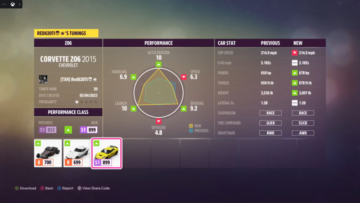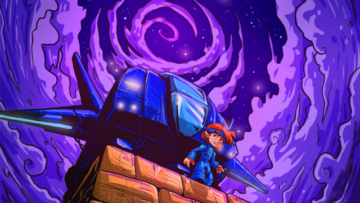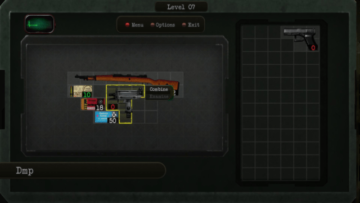

Being the son of David Cronenberg must come with its perks. Undoubtedly it’s given Brandon Cronenberg at least two free director-writer shots, with Antiviral and Possessor. They have both hit the target, so those shots will keep coming. But there’s some poison to that chalice. There’s no chance that Brandon Cronenberg was going to get away with making a music biopic or a romantic comedy. He’s locked into a particular way of making films. People want to know if there is some trickle-down perversion, thanks to the family name.
Infinity Pool feels, at first, like it might be the sobrest of Brandon Cronenberg’s output so far. Beginning like a third season of The White Lotus, just without the ensemble cast, it opens in a resort in the fictional country of Le Tolqa. This is a top-end, luxurious resort, where the spirit of colonialism seems to have been preserved. Locals serve the guests, presenting distillations of their customs through dance and music. Meanwhile, the guests lie in wicker chairs with open-shirts, smoking cigars.
We meet James Foster (Alexander Skarsgård) and Em Foster (Cleopatra Coleman), a married couple who seem a tad bored with it all. He is a writer who is trying to write the difficult second novel, using the holiday as inspiration, while she is old-money, and bankrolling the trip. They meet resort regulars Gabi Bauer (Mia Goth) and Alban Bauer (Jalil Lespert), who persuade them to rent a car and head out of the fortified walls of the campus, where they visit a less curated and sanitised beach.
Immediately, things go south. Gabi adopts the role of James’s ‘muse’ a little too forcefully. They all get drunk and friendly, and on the way back home, James crashes his car into a local farmer, killing him instantly. They flee the scene, only to be scooped up by the police the day after. It seems they rented their car from the brother of the chief of police – not the most perfect of crimes.
So far, so decidedly unCronenberg. But there’s a steep fall into horror at this point, as the Le Tolqans have a curious rule, borne from – as the film tells us – religious customs mixed with international treaties. Crimes are punishable by death, but that capital punishment does not have to be delivered to the criminal in question. Instead, a clone of the perpetrator can be created, with all the memories of the original, and THAT version of the person can be shot, stabbed or whatever by the victims of the crime, or their families. It’s an eye-for-a-cloned-eye, and the criminal can go back to enjoying the resort.
Brandon Cronenberg isn’t one for leaving it at that. Perversions have to stack up, rather than remain isolated. James gets the privilege of being in the audience for his death. As James watches his clone get stabbed by the local farmer’s son, he gets a mighty old kick out of it. It also turns out that others in the resort may have had similar experiences, and received similar kicks. There’s a touch of David Cronenberg’s Crash here, as a dysfunctional group finds their kinks in death and trauma. They form a kind of club or cult, and the movie travels in directions that we will try not to reveal.
These opening moments are the film’s best. There’s some subtlety here, as the discomfort at being the rich, white tourist grows steadily. A local rides his dirtbike into the resort and does doughnuts, trashing people’s bags. The western visitors are clearly doing more damage than good, and their entitlement is plain to see. The accident moves all the subtext into the text: the holiday-goers see themselves as better than the locals, and they will happily become monsters to protect that division.
But there’s a turning point, halfway through the movie, which is harder to swallow. It relies on believing that James would give in wholly to the cult of clone survivors. Part of our personal disbelief is down to the inscrutability of Alexander Skarsgård. He’s smirking but slightly cold in Infinity Pool, and we were left guessing to his thoughts. The other half of our disbelief was down to a lack of empathy. The clone-killing is so abstract that it’s hard to empathise. We guessed he felt a sudden relinquishment of accountability: he had nobody to answer to. That would excuse a lot of his future actions, but the rest was left more unknown than we would have liked.
The second half of Infinity Pool fails to keep up the momentum of the second. There’s nothing that gets close to the blinding imagination of the La Tolqan prison, and we were left with a reasonably by-the-numbers horror movie that veered between home invasion (with the protagonists being the invaders), and an escape-the-cult premise. The social commentary is still there, but it’s less subtle, less broodingly clever. Only a rug-pull in the prison, later on in the movie, really makes the second half worth watching. We also couldn’t abandon the feeling that the infinity pool aspect – watching yourself watching yourself and so on – didn’t get explored as well as we’d like.
Still, films are better when they frustrate while being ambitious, rather than squat in the middle of the road, being dull. Infinity Pool, for all of the late-in-the-game disbelief and lack of ideas, burns so brightly in its opening half that it’s worth investigating that ambition.
Coming out of Infinity Pool, there are images that have been seared into our brain, as you might hope from a Cronenberg joint. So, if you fancy that kind of mental griddling, then Infinity Pool is worth submerging yourself into.
- SEO Powered Content & PR Distribution. Get Amplified Today.
- PlatoData.Network Vertical Generative Ai. Empower Yourself. Access Here.
- PlatoAiStream. Web3 Intelligence. Knowledge Amplified. Access Here.
- PlatoESG. Automotive / EVs, Carbon, CleanTech, Energy, Environment, Solar, Waste Management. Access Here.
- BlockOffsets. Modernizing Environmental Offset Ownership. Access Here.
- Source: https://www.thexboxhub.com/infinity-pool-film-review/
- 1
- 12
- a
- ABSTRACT
- Accountability
- actions
- after
- AI
- Alexander
- All
- also
- ambition
- ambitious
- an
- and
- answer
- ARE
- as
- aspect
- At
- audience
- away
- back
- bags
- BE
- Beach
- become
- been
- beginning
- being
- believing
- BEST
- Better
- between
- both
- brandon
- burns
- but
- by
- Campus
- CAN
- capital
- Capital Punishment
- car
- chance
- chief
- clearly
- close
- club
- cold
- come
- Comedy
- coming
- Commentary
- content
- country
- Couple
- Crash
- created
- Crime
- Crimes
- Criminal
- curated
- Curious
- customs
- damage
- David
- day
- death
- delivered
- difficult
- directions
- Division
- does
- doing
- doughnuts
- down
- Empathy
- end
- Enter
- Entitlement
- Experiences
- explored
- fails
- fall
- families
- family
- far
- Film
- films
- finds
- First
- For
- form
- foster
- Free
- friendly
- from
- future
- GABI
- Get
- give
- given
- go
- going
- Gold
- good
- Group
- grows
- had
- half
- halfway
- Hard
- harder
- Have
- he
- head
- here
- him
- his
- HIT
- holiday
- Home
- hope
- Horror
- HTTPS
- ideas
- if
- Images
- imagination
- in
- in death
- infinity
- Inspiration
- instantly
- instead
- International
- into
- investigating
- Is
- isolated
- IT
- ITS
- james
- joint
- jpg
- just
- keep
- kick
- kind
- know
- LA
- lack
- later
- least
- leaving
- left
- less
- lie
- like
- Little
- Live
- local
- locked
- lot
- MAKES
- Making
- May
- Meanwhile
- meet
- memories
- MIA
- Middle
- might
- mighty
- mixed
- moments
- Momentum
- monsters
- Month
- more
- most
- movie
- Music
- must
- name
- no
- not
- nothing
- novel
- of
- Old
- on
- One
- only
- opening
- opens
- or
- original
- Other
- Others
- our
- out
- output
- part
- particular
- People
- perfect
- perks
- personal
- plain
- plato
- plato data intelligence
- platodata
- platogaming
- Point
- poison
- Police
- pool
- prison
- privilege
- protect
- question
- rather
- really
- received
- remain
- Rent
- Resort
- REST
- reveal
- review
- rich
- road
- role
- Rule
- scene
- season
- second
- see
- seem
- seems
- serve
- she
- shot
- similar
- Smoking
- So
- so Far
- Social
- some
- son
- South
- spirit
- stack
- steadily
- still
- subscription
- sudden
- Target
- tells
- text
- than
- thanks
- that
- The
- their
- Them
- themselves
- then
- there
- they
- things
- third
- this
- those
- Through
- to
- too
- touch
- trip
- try
- turning
- turns
- two
- undoubtedly
- unknown
- up
- us
- using
- version
- victims
- Visit
- visitors
- want
- was
- watching
- way
- we
- well
- were
- western
- whatever
- when
- where
- while
- white
- WHO
- wholly
- will
- win
- with
- without
- worth
- would
- would give
- write
- writer
- xbox
- Xbox Live
- Xbox Live Gold
- you
- yourself
- zephyrnet












